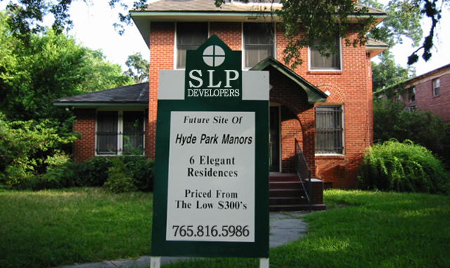
Photograph by By Montrose Patriot at English Wikipedia [Public domain], via Wikimedia Commons
Real Property Law

Photograph by By Montrose Patriot at English Wikipedia [Public domain], via Wikimedia Commons
Buying, selling, or leasing property can be complicated. It can be worse when there’s a dispute over property lines, or your neighbor has decided to help himself to your trees, or your tenants are trashing the beautiful home you’ve rented to them. Taking shortcuts or doing it yourself can be a costly mistake.
The term “real property” refers to land, and it is treated differently than personal property because of its unique status. The rules are stricter when it comes to buying, selling, or otherwise using land, and things quickly become confusing. Terms like “joint tenants” and “tenants in the entireties” and “life estate” quickly confuse people who have no specific training in real property matters, and these can easily lead to costly mistakes.
Buying/Selling Property
Whether you are buying or selling a home or other real estate, the size of the investment is substantial, and so are the potential liabilities. It is essential to have an attorney get involved to protect your interests. Too many people sign purchase agreements without having an attorney look them over. They don’t realize that once they sign the agreement, they are bound by the terms as written, so if some provision that the parties agreed upon did not get written into the contract, that provision cannot be enforced. Additionally, if you are the buyer and you sign the purchase agreement without obtaining the property disclosures prior to signing (or if you fail to make a provision within the contract that these disclosures must be provided to you within a specific number of days), then you have waived those disclosures and have no recourse in the courts regarding any property issues that were not disclosed by the seller. Nor do you want to sign the purchase agreement without having your financing in place or make provision in the agreement that failure to obtain financing will nullify the agreement. If you do and are not able to obtain a mortgage, the seller can take you to court for damages for failure to purchase the property.
Land Contract Purchases
Many people think that land contract purchases are easier than more traditional purchases, or that a “land contract” is as simple as a “rent to own” bargain where, if the buyer does not make all of the payments, the purchase money paid becomes “rent” and the seller assumes the role of landlord. Unfortunately, things are not so easy and land contracts can actually be more complicated and create headaches for both buyers and sellers. When purchasing property on land contract, you are bound to the terms of the contract; if you breach the agreement, then the seller can recover the property through an action of foreclosure or, if the land contract contains a provision for it, the seller may recover the property through an action for forfeiture. Generally, if a seller sues for recovery under forfeiture and receives a judgment, then the buyer has a specific amount of time to correct the breach (If the buyer has paid less than 50% of the land contract off, the redemption period is 90 days. If the buyer has paid more than 50% of the land contract off, the redemption period is 180 days). If the buyer fails to correct the breach within the time stated in the judgment, then the seller may have the buyer evicted in the same way that a tenant is evicted from rental property and the seller may keep all of the payments that the buyer has made up to that time. However, if the buyer pays the amount stated in the judgment then the land contract is reinstated and continues pursuant to its terms, which means if the buyer defaults again the seller must start the process over. If the seller sues for recovery under foreclosure and is successful in obtaining a judgment the court will order the property sold at public auction. The buyer will then have six months to redeem (obtain a new mortgage and pay off the land contract balance plus costs and fees) the land contract after the recording of the Sheriff’s Deed which transfers title to the property to the highest bidder at the public auction.
Many times, people try to buy and sell land on land contracts that were written up at the kitchen table by people with no legal training. These contracts leave ambiguities that confuse both the sellers and buyers, and when the unexpected happens it results in expensive litigation that benefits neither side.
Landlord/Tenant
Lease agreements contain their own pitfalls. Both landlords and tenants have rights and interests that need to be protected, and they frequently do not understand what these rights and interests even are. This is why it is essential for any lease to be drafted and reviewed by an attorney. This holds true for lease agreements whether you are a landlord or a tenant. Agreements involving real property must be in writing to be enforceable; agreements not specified in the written lease agreement or specifically provided for by statute will not become part of the contract, even if the parties agreed to them prior to signing.
It is also worth noting that residential tenants have much more protection than do commercial tenants. If you enter into a commercial lease agreement, there may be provisions in the agreement that the landlord has the ability to raise your lease payments due to an increase in property taxes, insurance premiums, and various other costs. In commercial real estate law, it is assumed that all parties are knowledgeable business persons and the courts will not rescind a contract because one or more of the parties did not understand what the provisions of the lease agreement said. For example, if you did not have a provision pertaining to the premises being free from mold and you do not have an inspection done to make certain that there is no mold, the court will enforce the lease as written and assume that you accepted the premises “as is”. This is unlike residential leases where the court makes the assumption that the landlord will keep the premises habitable and require the landlord to correct any violations of habitability.
Things get worse when conflicts arise between landlords and the tenants. Too often, landlords try to simpy “change the locks” when a tenant has not paid rent, leading to liability for illegal eviction. Residential leases are more complicated, especially when dealing with security deposits, and there are very specific procedures that must be followed by both landlord and tenants when a tenant moves out.
Border Disputes
There are sometimes issues related to “who owns what”: where there are conflicting surveys, or mistaken beliefs about property lines, valuable property can become a flashpoint of contention. This is especially true when someone starts constructing buildings or erecting fences; in Michigan, once a piece of property has been used for 15 years without the true owner doing anything to stop it, the person who has been using the property can obtain a title to it through adverse possession. This can affect the value of not only the property in question, but sometimes the property around it. Border disputes can be ugly and expensive, especially when people try to handle them on their own.
Avoid the Pitfalls
The stakes are extremely high when it comes to any agreement involving real property. The best course of action, of course, is to consult a knowledgeable attorney before entering into any kind of an agreement related to real property. Failing that, if you find yourself in a dispute, it is absolutely essential that you obtain assistance to protect your interests. Contact us, and we will be happy to make sure you have someone on your side.
This site and all contents ©2020 Shelton Legal Services, PLLC (except where otherwise indicated) • All Rights Reserved
Information presented on this site is intended for educational purposes only and does not constitute—and should not be considered a substitute for—legal advice. Neither use of this website nor communications through it (including but not limited to messages in forums or answers in the “Ask a Lawyer” section) create an attorney-client relationship. For legal assistance, contact a lawyer.
